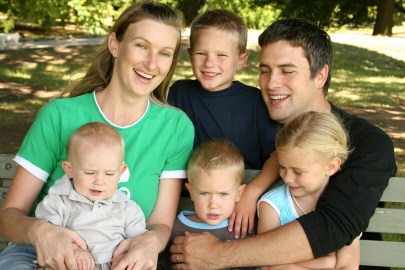The Secret to Marital Happiness: Don’t Have Kids or Have Lots of Them

That’s the conclusion of this study.
The discovery that being married without children is one path to happiness vindicated the feminists, the liberationists, the authentic followers of Simone de Beauvoir. Authentic people live for themselves; they refuse to be breeders; their lives are fulfilled without giving into some biological inclination shared with the other animals.
But this line of thinking easily leads to this conclusion: Why get or stay married at all? Marriages without children may be happier, but they also end more often in divorce. The philosopher Nietzsche observed that one great error of the modern, liberal West is the sentimental, unempirical thought that love, by itself, will keep us together.
Having kids does tend to keep marriages together. And if you’re going to go that route, the more the happier. Four or more kids seems, in a significant number of cases, to be the key here.
The authors of the study speculate on why that’s true:
What accounts for the surprisingly higher levels of marital bliss among parents of large families, given the obvious financial, practical, and emotional challenges of raising a large family in contemporary America? This finding seems to be largely a “selection” story, in which particular types of couples end up having large numbers of children, remain married to one another, and also enjoy cultural, social, and relational strengths that more than offset the challenges of parenting a large family. In this case, the Survey of Marital Generosity suggests that fathers and mothers of large families are partly happier because they find more meaning in life, receive more support from friends who share their faith, and have a stronger religious faith than their peers with smaller families.[1]
Take religious attendance. Figure A2 shows that the parents of large families are about twice as likely to attend church, synagogue, or mosque on a weekly basis or more often. It is certainly possible that having a large family can bring some people to their knees! But it is also likely that highly religious men and women feel called by God or encouraged by their religious networks of friends and family members to have large families.[2]
So are these people happier because they’re more generous, more relational, more purposeful, and/or more religious? Do they have larger families because they’re more religious—or feel called by God or their fellow believers to be fruitful and multiply? Or are they more religious because they have lots of kids—and so need and want to support and encouagement of a “church family?”
We do know, of course, that maybe the big reason America doesn’t suffer from anything like the birth dearth of many other highly developed and prosperous countries is the fecundity of our observant religious believers. When I think big family, I immediately think of the Mormons, the orthodox Jews, the evangelicals of various kinds, and more traditionalist Catholics. I also think home schoolers.
Now the study’s authors do add that we don’t know for certain who’s happy. The study relies on people’s self-reporting. It could be, they mention in passing, that people who have the most invested in kids have to believe they’re happy in their choices to get through the day. They’re stuck with the kids, like or not.
Why are those who have just a kid or two or three—those who practice moderation, it would seem—less happy that the extremists in both directions?
Here are a few highly speculative observations:
1. People with a kid or two are robbed of happiness by excessive parental paranoia. If you have lots of kids, you have to relax more than a bit in each particular case.
2. That paranoia might have a Darwinian explanation: If your point in life is to get your genes to the next generation, then the one-kid strategy is highly risky. Have yourself ten kids, and success is pretty much guaranteed.
3. The people who have no kids and the people who have lots of them are made happy by lives that have a kind of integrity. Either you’re all about personal autonomy or you’re all about family. Either you’re the free individual described by Locke or Beauvoir or you’re the social, reproductive animal described by Darwin.
4. Attempting to balance being an autonomous individual and a social animal produces a kind of incoherence that leads to misery. You’re constantly confused and being pushed in different directions. You can’t even explain to people who you are. That’s doubtlessly part of the misery in the midst of prosperity of which Americans, Tocqueville observed, are perversely so proud.
5. But all we have here, after all, are statistically significant but not overwhelming tendencies. I’m happily married and only have one kid. I admit, however, to having been overwhelmed with Darwinian relief when my daughter had a grandson.





